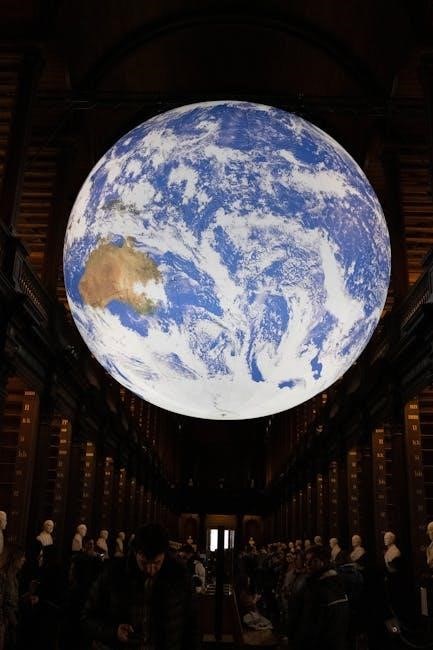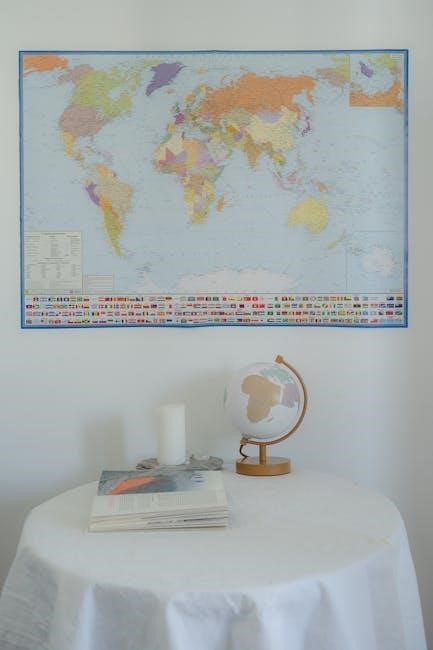
great books of western world pdf
The Great Books of the Western World is a renowned collection of influential writings that have shaped Western civilization, featuring works by iconic authors like Homer, Shakespeare, and Plato. This series, published by Encyclopædia Britannica, aims to provide a comprehensive liberal education through timeless literature and philosophy. PDF versions of these volumes are widely available, offering modern readers easy access to these foundational texts.
Overview of the Series
The Great Books of the Western World, published by Encyclopædia Britannica, is a 54-volume set showcasing seminal works from Western literature and philosophy. Spanning ancient to modern times, it includes masterpieces by Homer, Shakespeare, Plato, and others. Designed to foster a liberal education, the series emphasizes critical thinking and exploration of enduring ideas. Each volume is carefully curated to represent the evolution of Western thought. The collection is now widely available in PDF format, making these timeless works accessible to a global audience. It remains a vital resource for scholars and enthusiasts alike, promoting intellectual engagement with the foundations of Western culture.
Historical Context and Significance

The Great Books of the Western World emerged from a 20th-century initiative to preserve and promote the core texts of Western civilization. Conceived during a period of global upheaval, the series was first published in 1952, reflecting a post-war emphasis on education and cultural preservation. It was designed to provide a comprehensive understanding of the intellectual traditions that shaped Western society. By compiling works from ancient Greece to modern times, the collection offers a chronological exploration of ideas that have influenced art, science, philosophy, and politics. Its significance lies in its role as a cultural touchstone, making complex ideas accessible to a broad audience and fostering a deeper appreciation for the Western intellectual heritage.

Structure and Content of the Series
The Great Books of the Western World is organized into 54 volumes, spanning from ancient to modern works, covering philosophy, literature, science, and more.
Volume Breakdown and Key Authors
The Great Books of the Western World spans 54 volumes, each meticulously curated to represent the evolution of Western thought. The series begins with ancient works like Homer’s Iliad and Odyssey, Sophocles’ tragedies, and Platonic dialogues. Key authors include Aristotle, whose philosophical treatises dominate early volumes, and later figures like Dante, Shakespeare, and Milton, whose literary masterpieces are cornerstone texts. The collection progresses chronologically, featuring works by Locke, Rousseau, and Kant, among others. PDF versions of these volumes preserve the original structure, ensuring access to seminal works that have shaped Western civilization. This comprehensive anthology is a vital resource for scholars and enthusiasts alike.
Notable Works Included in the Collection
The Great Books of the Western World encompasses a vast array of iconic works, including The Divine Comedy by Dante, Shakespeare’s complete plays, and Milton’s Paradise Lost. The collection also features foundational philosophical texts such as Plato’s Republic, Aristotle’s Physics, and Kant’s Critique of Pure Reason. Literary masterpieces like Homer’s epics and Virgil’s Aeneid are included, alongside influential works from the Enlightenment, such as Locke’s Essay Concerning Human Understanding. PDF editions of these works ensure accessibility, allowing readers to engage with the intellectual pillars of Western culture. This anthology is a treasure trove of knowledge, offering insights into the development of human thought and creativity.

Key Themes and Ideas Explored
The collection delves into universal themes such as human nature, justice, morality, and the pursuit of knowledge, fostering a deep understanding of Western philosophical and literary traditions.
The Great Conversation: A Liberal Education
The Great Books series embodies the concept of “The Great Conversation,” a term coined by Robert M. Hutchins to describe the ongoing dialogue between great thinkers across centuries. This liberal education approach encourages readers to engage with seminal texts, fostering critical thinking and intellectual growth. By exploring works from Homer to Freud, the series provides a comprehensive understanding of Western civilization’s intellectual heritage. The goal is to equip readers with the tools to participate in this enduring conversation, fostering a deeper appreciation of philosophy, literature, and the humanities. This approach emphasizes the timeless relevance of these works in shaping modern thought and cultural values.
Major Contributions to Western Philosophy and Literature
The Great Books of the Western World series offers a vast repository of texts that have profoundly influenced Western philosophy and literature. Works by Aristotle, Plato, Shakespeare, and Dante Alighieri are included, showcasing foundational ideas in ethics, metaphysics, and storytelling. These texts have shaped Western thought, from the philosophical underpinnings of democracy to the literary masterpieces that define cultural identity. The series also features contributions from modern thinkers like Freud and Darwin, whose works revolutionized their fields. By making these works available in PDF format, the series ensures that their insights remain accessible, allowing readers to explore the evolution of Western intellectual traditions in depth.

Accessing the Great Books in PDF Format

The Great Books of the Western World are widely available in PDF format, offering easy access to these foundational texts through platforms like Archive.org and more.
Availability and Download Options
The Great Books of the Western World are readily accessible in PDF format, with volumes available for download on platforms like Archive.org and various digital libraries. Users can explore the entire collection, including works by Aristotle, Shakespeare, and other luminaries, without cost. Additionally, PDFs are compatible with multiple devices, ensuring flexibility for readers. Some platforms offer bulk downloads, while others provide individual volume access, catering to diverse preferences. This ease of access has made these classic texts more attainable than ever, fostering a broader engagement with Western literary and philosophical heritage.

Popular Platforms for Digital Access
Several platforms offer digital access to the Great Books of the Western World in PDF format, making these classical texts widely available. Google Books and Project Gutenberg provide free access to many volumes, while platforms like Internet Archive host complete collections. Additionally, some academic and literary websites offer downloadable PDFs, ensuring that readers can easily access these foundational works. These platforms cater to a global audience, allowing users to explore the series from any location with internet access, thereby promoting a broader engagement with Western literary and philosophical heritage.

Modern Relevance and Impact

The Great Books of the Western World remain influential in contemporary thought, offering insights into timeless themes and fostering critical thinking in modern education and discourse.
Contemporary Discussions and Reviews
Contemporary discussions surrounding the Great Books of the Western World often highlight their enduring relevance in understanding Western civilization. Scholars and readers alike debate the series’ role in shaping liberal education, with many praising its inclusion of foundational texts by Homer, Shakespeare, and Plato. The availability of these works in PDF formats has made them more accessible, sparking new conversations about their significance in the digital age. Reviews frequently emphasize the collection’s historical depth and its ability to provoke critical thinking. However, some critics argue that the series lacks diversity in representation, prompting discussions about inclusivity and the broader canon of Western literature.
Challenges and Criticisms of the Series
The Great Books of the Western World series has faced notable challenges and criticisms, primarily concerning its limited representation of diverse voices. Critics argue that the collection predominantly features works by white, male authors, often overlooking contributions from women, minorities, and non-European cultures. This lack of inclusivity has sparked debates about the narrowness of the Western canon. Additionally, the series’ focus on classical texts has led some to question its relevance in contemporary contexts. Despite these criticisms, the collection remains a significant resource for understanding the foundational ideas of Western civilization, even as efforts to expand and diversify similar collections continue.
The Great Books of the Western World series stands as a monumental achievement in preserving and promoting the foundational texts of Western civilization. By compiling works from ancient to modern times, it provides a comprehensive exploration of human thought and culture. While debates persist about its inclusivity and relevance, the series remains an invaluable resource for education and intellectual growth. Easily accessible in PDF formats, these works continue to inspire new generations, fostering a deeper understanding of the ideas that have shaped our world. As a testament to the enduring power of literature and philosophy, the Great Books series ensures that these timeless works remain accessible for future scholars and readers alike.

